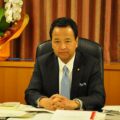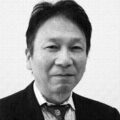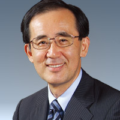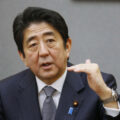(JAPAN POLITICS CHANGED?) Japan to End Deflation through Creation of Growth
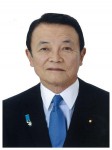
Aso Taro
Japan, reeling from years of sluggish growth and deflation, can learn from its experience in the 1930s, Deputy Prime Minister and Finance Minister Taro Aso said in an interview. The aggressive monetary easing policy adopted by then Finance Minister Korekiyo Takahashi (1854-1936) boosted demand, making Japan the first country among “Western” nations to emerge from the Great Depression. He said the key to success is simultaneous implementation of three policy steps – massive monetary stimulus by the Bank of Japan (BOJ), fiscal stimulus and measures to push the private sector toward capital investment.
(The interview was conducted by FACTA monthly magazine on Dec. 20, 2012, prior to his appointment as financial chief in Prime Minister Shinzo Abe’s Cabinet on Dec. 26.)
Question: Prime Minister Shinzo Abe’s economic policies – widely known as “Abenomics” – call for bold credit easing to beat deflation. But some people are opposed to the idea, citing a potentially damaging impact on the BOJ’s independence, while others argue that monetary easing is not enough to get the economy on a recovery track.
Aso: There are some historical aspects that require reflection. Japan has experienced several rounds of recession since the end of World War II in 1945, all of which were due to inflation. The current state of economic difficulties stems from the negative impact of deflation, but it took some time for us to realize this. We couldn’t learn from experience since we hadn’t seen deflation in the past 67 years, or since the end of the war. But there was an exemplar in the 1930s – Korekiyo Takahashi, the finance minister during the era of the Great Depression, who successfully combatted deflation.
Question: Takahashi is known for his aggressive fiscal policy after Prime Minister Osachi Hamaguchi (1870-1931) and BOJ Governor Junnosuke Inoue’s (1869-1932) liberalization of gold exports and austere fiscal policy aggravated deflation.
Aso: Takahashi instructed the BOJ to print more notes, saying he would spend all of them. He poured money into social infrastructure and measures to create jobs. U.S. newspapers called Japan “the first country in the world to get out of deflation.” Franklin D. Roosevelt, then the democratic presidential candidate, copied Takahashi’s fiscal policy, which led to his landslide victory in the 1933 presidential election. Roosevelt kept his campaign pledges and enacted “New Deal” economic policies to boost the economy. U.S. gross national product (GDP), which had been halved in the wake of recession, recovered to previous levels in three and a half years, while the unemployment rate plummeted to 12 percent from 20.9 percent. He was re-elected thanks to this stellar economic performance.
“Three Arrows”
Question: Is “Abenomics” a modern version of Takahashi’s economic policy?
Aso: There are three tasks that we need to tackle to beat deflation. One is monetary easing by the BOJ, but that alone is not enough. The BOJ in the early 2000s injected 20 trillion yen to 30 trillion yen into the economy by easing money supply, but there was hardly any impact in turning the economy around. Money stays at banks unless there is real demand and borrowing rises. In order to stimulate real demand, we need action in the other two areas.
Question: Is fiscal spending one of them?
Aso: The government must boost fiscal spending to encourage capital investment in the private sector. A recent example of a policy failure is the child allowance program launched by the government of Democratic Party of Japan (DPJ) in 2010. The impact on the economy was nil as parents put the money in their bank accounts and did not spend it. In contrast, the 700 billion yen government incentive for purchases of household electronics appliances, which was started in 2009, had wide repercussions – some seven times more than the actual subsidies spent. We’ll focus on projects that would boost investment and jobs.
Question: For example?
Aso: We will change port regulations and increase the depth of major ports to 18 meters from the 14 meters at present as container vessels are becoming larger and the expansion of the Panama Canal would make it 18 meters deep. That will create public works and reduce costs by allowing vessels to reach piers directly and making trans-shipment work at Shenzhen or Singapore unnecessary. Construction of an underground electric cable system is also among potential projects. That would widen roads, provide safe passage for pedestrians, reduce the risks of power blackouts and create jobs. These outlays are important as necessary repair work on aging tunnels and highways had been postponed under the DPJ government’s cost-cutting program.
Question: What is the third strategy of Abenomics?
Aso: In contrast to Takahashi’s era, the private sector now has more money than the public sector. Internal reserves have built up over the past decade and, I think, more than 40 percent of companies listed on the First Section of the Tokyo Stock Exchange are free of bank loans. We need solid growth measures that make businesses willing to part with their saved money. Deregulation is a good case in point. We should give favorable tax treatment to companies investing in assets, for instance, like allowing them to write off all the depreciation at once. Strong political leadership is required to simultaneously implement the three measures. It won’t work if the BOJ and various ministries move separately. Policymakers should paint a broad picture and show clear targets, or our goal of ending deflation will never be achieved.
Corporate Tax Cuts Won’t Work
Question: We understand a supplementary budget is your top priority for now.
Aso: The process of compiling the budget for fiscal 2013 that starts on April 1 has been delayed. So there is no other way but to go with a supplementary budget this fiscal year to jump-start growth programs in April and May. Unless something like a 15-month budget is formulated in the current fiscal year, things will not move. Wage increases usually emerge at the last stage of an upward cycle of the economy, which starts with a pick-up in sales followed by an increase in borrowing, a rise in demand and more job opportunities.
Question: Does it mean voters won’t feel the full impact of the stimulus in the next six months or one and a half years? Isn’t that too late for the upper house election scheduled in July? The fiscal cliff in the United States and China’s anti-Japan sentiment could cast shadows over the economy in the meantime.
Aso: If businesses become active, housewives will see the change through their husbands’ behavior, and tend to increase consumption spending. As for foreign concerns over a potential boost in Japan’s exports, Prime Minister Abe has been articulate about the important role of domestic demand. Japan’s exports account for only 11 percent of GDP, compared to 40 percent for Germany and more than 30 percent for China. Only countries like the United States and Brazil among the G20 members rely less on exports than Japan. Given the vast size of domestic demand, 90 percent of Japan’s GDP, boosting domestic demand is the top prerequisite for Japan. A weak yen will revive the export-oriented companies that are now not paying tax, leading to a robust increase in government tax revenues in the initial year.
Question: Are you planning a corporate tax cut, like Britain did?
Aso: I’d like to ask business people how much their companies pay in corporate tax. Banks haven’t paid even one yen for 10 years. Given the economic weakness, even a zero tax rate wouldn’t bring about any positive results. That’s an issue to consider when the economy improves, but not now. I would say a tax break on capital investment and one-time depreciation would be more effective in igniting capital outlays than tax cuts.
Question: It’s a must for the government to boost the economy in the April-June quarter because the ruling parties have agreed to raise the consumption tax on condition that the economy then is sound.
Aso: At the Finance Ministry, the people who managed to boost taxes are heroes. In 1997, Japan raised the consumption tax from 3 percent to 5 percent, but revenues from income, corporate and consumption taxes all fell partly due to the subsequent Asian currency crisis and a series of business failures among big financial institutions, including Yamaichi Securities Co. Then Prime Minister Ryutaro Hashimoto took the blame and stepped down, but the Finance Ministry was also responsible for this unfortunate outcome. There is no point in a tax hike if there is no revenue increase. We simply want to see higher tax revenues. From the wider perspective of managing the country, short-sighted talks like whether or not to raise the consumption tax do not make sense.
Question: Some people are against the LDP’s plans to reinforce roads, bridges and buildings to make them more resilient to earthquakes and put more funds into public works projects. They call the plans pork-barreling in the run-up to elections. How would you respond?
Aso: Carrying out necessary public works projects stands to reason. A major earthquake is highly likely to hit the Tokai region in central Japan. But Shizuoka Prefecture is probably the only prefecture in the region whose school gymnasiums have been properly reinforced. People are now earnestly seeking safety and security. Newspaper debates sometimes do not make much sense.
Question: The government has revived the Council on Economic and Fiscal Policy, a group of advisors to the prime minister, including the BOJ governor. Are there any risks of clashes or friction with the newly established Headquarters for Japan’s Economic Revitalization?
Aso: The council has a strong mandate to help promote the prime minister’s policies, but the latter, worked out by the ruling party’s Policy Research Council, has no legal authority. Close communications are important for such party-linked bodies. The headquarters can come up with a draft of budget outlines earlier than the council. They will also be more flexible in working out ideas. Adjustment of different views among different organizations is a daily routine in the political world, with the prime minister having the final say.
Question: What will happen to the Japan-South Korea currency swap agreement? The two countries in late 2012 agreed to cut the size of the swap contracts to $13 billion amid enduring tensions over a territorial dispute.
Aso: Historically, China has tried to ensure its security by having two neighboring states fight each other, such as Vietnam and Cambodia, or Japan and South Korea. It is unwise for Japan and South Korea to collide at this time. In South Korea, the financial sector has not yet fully matured. Many South Korean financial institutions are as small as Japan’s credit cooperatives, while big banks are borrowing from European banks. But they need more cash, as some European banks have withdrawn funds amid the sovereign debt crisis and have resorted to Japanese banks. U.S. banks are not as strong as before either. Against this backdrop, Japan may consider partnering with South Korea as a way to counter the expansionism of China.
====================
Edited and translated by Facta Publishing Ltd. The original interview story appeared in Japanese in the February 2013 issue of FACTA monthly magazine (pages 28-30), published by Facta Publishing Ltd.
Taro Aso was born in Fukuoka Prefecture in 1940. He is the grandson of former Prime Minister Shigeru Yoshida (1878-1967). After graduating from Gakushuin University’s Faculty of Politics and Economics, he joined the Aso group, a conglomerate of cement, medical and education businesses in Fukuoka Prefecture in 1966. He took the helm of Aso Cement Co. in 1973, and became the head of the Junior Chamber International Japan in 1978. He was elected to the Lower House for the first time in 1979. He has since held the posts of minister for economic and fiscal policies, minister of internal affairs and communications, and foreign minister. He was Japan’s prime minister from September 2008 to September 2009.
